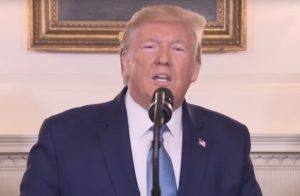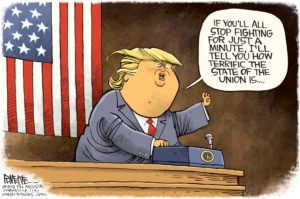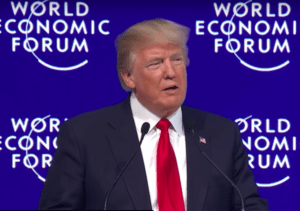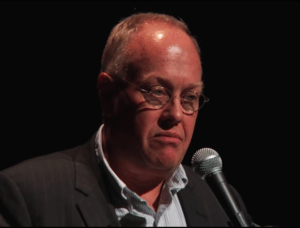Why Bush’s Speech Didn’t Matter
None of the progressive-sounding proposals in the president's speech stand any chance of actually arriving on Capitol Hill as legislation.If America’s need for substantial leadership were not so grave, we might find some dark amusement in George W. Bush’s latest attempt to escape his own political quagmire. Sinking to Nixonian levels of public distrust and disdain in most polls, and facing a Democratic Congress, he tried to shift the focus to healthcare, climate change and educational reform in his annual address to Congress.
As his presidency enters its twilight years, Bush evidently wishes he could revisit the sunny days of “compassionate conservatism,” when gauzy proposals and happy talk so easily beguiled so many voters.
His problem is that we have heard all this before, and we know him too well by now.
Every year in his State of the Union address, he feigns deep concern over the same issues. He always urges independence from foreign oil, rapid development of alternative energy sources, effective use of conservation and improvement of the environment. (Remember his “switch grass” biofuel program from last year?) He always promises to make affordable healthcare available to more of the uninsured and their children.
The chances are that few, if any, of the proposals advertised in his speech will actually arrive on Capitol Hill as legislation — or that he will even bother to mention them again, unless he recycles the same ideas next year. They are really desperate cries for approval from a president who has permanently forfeited the popularity he once brandished like a weapon.
His bigger problem, of course, is that he still refuses to face the failure of his military and diplomatic policies in Iraq — and the rejection of his escalation plan even by members of his own party. He seems to believe that he can buy off or distract the burgeoning opposition to the Iraq debacle by promising to deal with other issues “that people care about,” as his flacks would say.
Today, however, there is no issue that people care about more than the war. And on the question of how to extricate us from the disaster that he and his administration have created, he simply has no credibility. When he claims that his critics have no alternative to his military escalation, they should refer him to the best-selling Iraq Study Group report, which outlines a highly specific plan for reconciliation, amnesty and negotiated withdrawal of U.S. forces.
In this moment, as in so many others since Bush first took the oath of office, his distinguishing characteristic is the squandered opportunity. After 9/11, he could have brought the country together, and instead decided to aggrandize his party and his own power. He could have brought the world together to confront civilization’s enemies, from Osama bin Laden to Saddam Hussein, and chose instead to ruin traditional alliances in an aggressive, illegal and unnecessary war.
Had he not made those stupid choices, and were he not blinded by his arrogance, then today he might be able to take advantage of crucial opportunities to improve the future of the United States and planet Earth.
At no time in recent years, for instance, has there been such broad consensus, in the business community as well as the labor movement, and among citizens of all political persuasions, that we must reform the American healthcare system to contain costs and provide universal coverage. Both nationally and internationally, the same kind of consensus exists for strong measures to cope with global warming, as corporate executives sit down with environmental leaders.
Yet the healthcare schemes floated by the president and his aides would achieve little except to damage the present system of employer coverage without building a viable replacement. That is why the advocates of universal care will scarcely bother to deconstruct the Bush plan, which was dead on arrival.
As for his energy proposals, they are too little and too late, coming from a president who has so reliably behaved like a stooge for the oil and coal interests. He has consistently opposed substantial fuel-economy standards, and the White House has even expressed opposition to the modest House legislation that cuts the ridiculous subsidies to the oil industry and redirects the funding to renewable energy.
When Bush was truly popular, the horizons for achievement seemed almost limitless. Now that he is truly scorned, his possibilities seem nil. How silly and how sad that he still expects us to believe him.
Joe Conason writes for the New York Observer (www.observer.com). To find out more about Joe Conason, visit the Creators Syndicate website at www.creators.com.
Copyright 2007 Creators Syndicate Inc.
Your support matters…Independent journalism is under threat and overshadowed by heavily funded mainstream media.
You can help level the playing field. Become a member.
Your tax-deductible contribution keeps us digging beneath the headlines to give you thought-provoking, investigative reporting and analysis that unearths what's really happening- without compromise.
Give today to support our courageous, independent journalists.









You need to be a supporter to comment.
There are currently no responses to this article.
Be the first to respond.